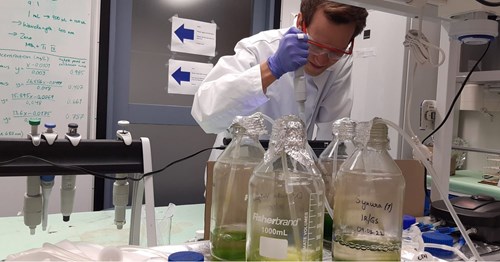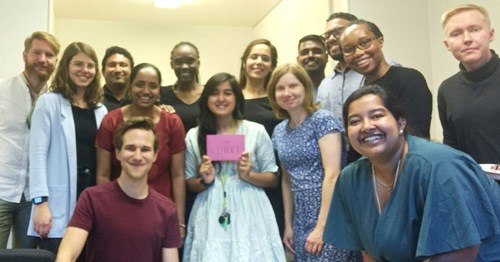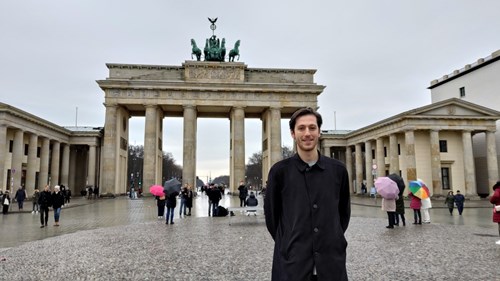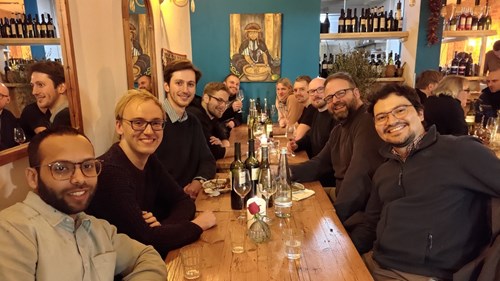Mgr. František Zažímal is studying in the 2nd year of the PhD program in Physics, specializing in Plasma Physics. In the academic year 2022/2023, he went on an internship abroad to Kuopio, where he spent 6 months at the Fine Particle and Aerosol Technology Laboratory (FINE) at the University of Eastern Finland. His doctoral thesis mainly focuses on the photocatalytic nanomaterials used for water purification or treatment.
What surprised you most at the foreign institution, both positively and negatively?
After arriving at the institution, I was surprised to register the quality of the university's facilities. The equipment of the laboratories was wealthy; I had all the analytical instruments at my disposal on a single floor. It was also pleasant that any laboratory material could be purchased in the store, which was also part of the university. In addition to the high quality of the working facilities, the university was also equipped above standard for sports activities – sports courses, gyms, gymnasiums, swimming pools and, of course, saunas were available for a nominal fee. The university buffet or cafe was very representative, where you could also go for breakfast in addition to lunch. In general, the university placed a lot of emphasis on activities outside work. A negative experience was that dealing with administrative matters took longer time.
What was your typical work week like?
I performed photocatalytic experiments under UV and visible light with various materials in the form of layers and nanopowders. We tested various pollutants, from organic acids to various pharmaceuticals. I analyzed the results using a number of physical and chemical methods.
How was the atmosphere in the group compared to your home institution?
Even though I worked alone most of the time, in case of problems, my colleagues were always willing to help me if needed. However, there were occasional linguistic and cultural misunderstandings. Overall, however, I like the atmosphere of the group here more because I see it as more friendly and open.
What was your take-home message from the internship?
I started using the word "different" instead of "special". I improved the planning of work activities and realized that it is very important to divide the days into work and leisure correctly.
How do you deal with the results obtained?
After further research, we would like to publish the results in a quality scientific journal and present them at conferences.
Do you plan to continue your cooperation with this foreign institution?
Yes, I was invited to work there again. We are still in contact with the group and are working together to analyze the results.
How do you rate your several-month stay in a foreign country, and what was your most significant "non-scientific experience"?
I have an abundance of experiences outside of the university. Most of them are related to meeting new friends from different parts of the world. Personally, I remember the moment when I saw the northern lights (aurora borealis) for the first time in my life.
Mgr. Július Vida is studying in the 4th year of the PhD program in Physics, specializing in Plasma Physics. In the 2022/2023 school year, he went on an internship abroad to Berlin, where he spent 6 months in the Hybrid Devices Group at Humboldt Universität. His doctoral thesis focuses on modifying surfaces and interfaces of printed functional layers using atmospheric plasma. He is a successful holder of the Brno Ph.D. Talent grant 2019/2020.
What surprised you most at the foreign institution, both positively and negatively?
The biggest positive surprise was the speed with which they trained me to work. Practically within two days, I completed all the safety training at work. Overall, I rate the support I received as a researcher very positively.
As for negatives, it is hard to find. The biggest problems I had were finding accommodation and the price of accommodation, but that was to be expected from a metropolis like Berlin.
What was your typical work week like?
My typical work week was very structured, balancing experimental work in the lab with data analysis and interpretation. Also, regular meetings with my supervisor and other research group members took place to discuss progress and resolve any issues.
How was the atmosphere in the group compared to your home institution?
The atmosphere in the research group in Berlin was more collaborative and team-oriented. A strong emphasis was placed on sharing ideas, which allows for more effective communication and faster problem-solving.
What was your take-home message from the internship?
My "take-home message" from practice was the importance of cooperation and quality management. It also reinforced in me the value of communication and teamwork in achieving research goals.
How do you deal with the results obtained?
I plan to use the results of my internship research to complete my dissertation. We also plan to publish our results.
Do you plan to continue your cooperation with this foreign institution?
Getting new contacts in such an economically important country as Germany was my main goal before leaving for the internship. I greatly value the relationships that have been formed and plan to continue working with colleagues from Berlin, potentially on future research projects or joint experiments.
How do you rate your several-month stay in a foreign country, and what was your most significant "non-scientific experience"?
Overall, I rate the stay extremely positively. I am glad that I decided to travel for up to half a year, and I managed to get the most out of the internship. Berlin is the biggest city I have spent a long time in, and it was amazing to learn about the cultural differences between individual districts, which often resembled separate cities within a city. I really enjoyed walking through the streets of Berlin on the weekends and observing the unique atmosphere created by the coexistence of all cultures from all over the world in one place.






